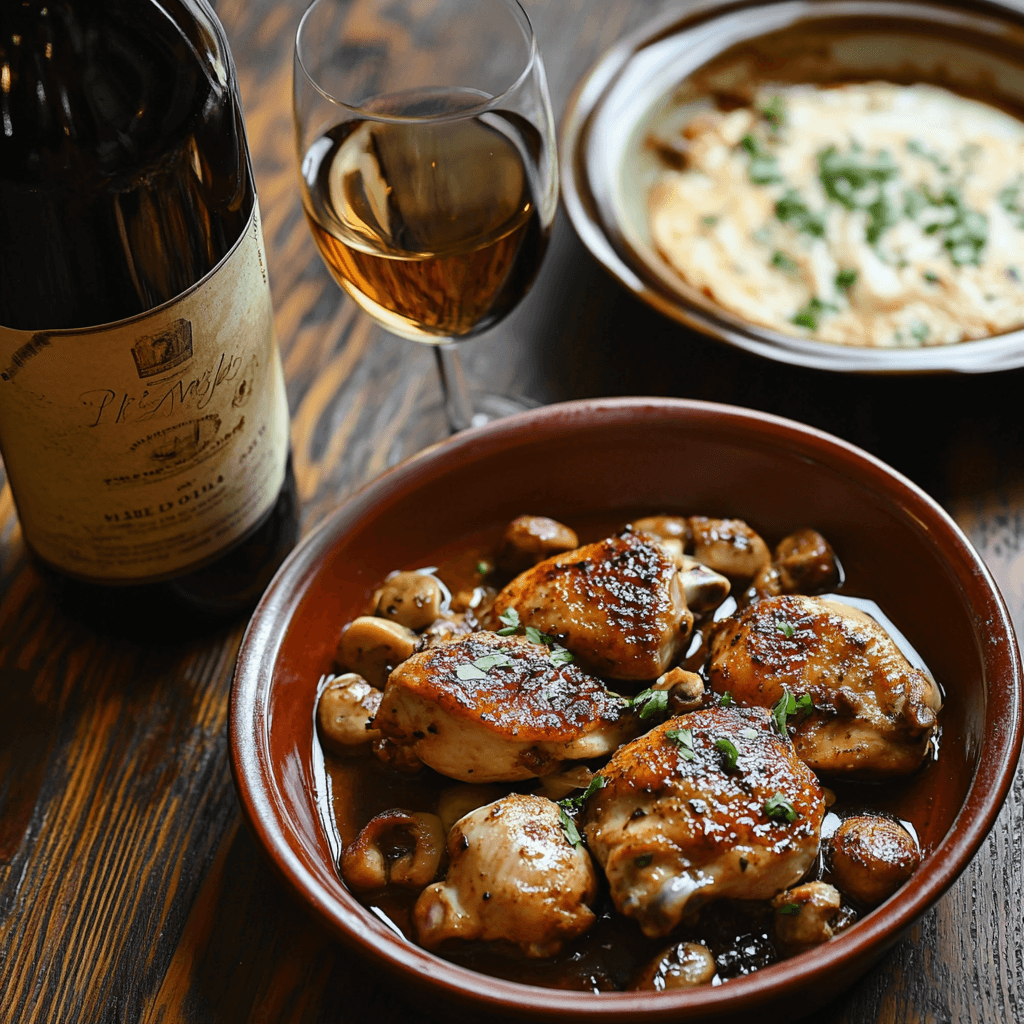
Cooking often requires a delicate balance of flavors, and the right ingredients can make or break a recipe. Marsala wine, with its rich and slightly sweet profile, is a popular ingredient in many savory and sweet dishes. But what happens if you don’t have Marsala wine on hand? Can you use balsamic vinegar as a substitute?
The short answer is yes, but there’s more to the story. Understanding the characteristics of both Marsala wine and balsamic vinegar is crucial to making this substitution work. This article explores the nuances of these two ingredients, offering practical advice for when and how to use balsamic vinegar in place of Marsala wine.
Table of Contents
What is Marsala Wine?

Marsala wine is a fortified wine originating from the Italian region of Sicily. Known for its rich flavor and versatility, it is a staple in many kitchens, particularly for enhancing the depth of both savory and sweet dishes. The distinct taste of Marsala wine comes from its unique production process, where the wine is fortified with brandy and aged to develop complex flavors.
Types of Marsala Wine
Marsala wine is categorized into several types based on sweetness levels and aging duration. The most common categories include:
- Secco (Dry): Contains up to 4% residual sugar and is ideal for savory recipes like sauces or meat dishes.
- Semisecco (Semi-Dry): Slightly sweeter, making it suitable for a broader range of dishes.
- Sweet Marsala: Often used in desserts or for recipes that require a rich, caramelized flavor.
The aging process further defines Marsala wine into classifications like Fine, Superiore, and Vergine, each offering distinct taste profiles.
Culinary Uses of Marsala Wine
Marsala wine is beloved in cooking for its ability to add depth and richness to recipes. Its versatility is showcased in dishes like:
- Savory Dishes: Used in sauces for chicken Marsala, veal, or mushroom-based recipes, its flavor complements meats and earthy ingredients.
- Desserts: Integral in classic Italian desserts like zabaglione and tiramisu.
- Reduction Sauces: Marsala wine is often reduced to a syrupy consistency for glazing dishes or enhancing flavor.
Its slightly sweet and nutty flavor makes Marsala wine a unique ingredient that can’t be replicated easily, but substitutes like balsamic vinegar can offer a workaround when needed.
What is Balsamic Vinegar?
Balsamic vinegar is a highly prized ingredient originating from the Emilia-Romagna region of Italy. Known for its dark color, syrupy consistency, and rich, tangy-sweet flavor, it has become a cornerstone in both traditional and modern cuisine. Unlike most vinegars, which are derived from alcohol, balsamic vinegar is made from grape must, the freshly crushed juice that includes the skins, seeds, and stems of the grape.
Types of Balsamic Vinegar
Not all balsamic vinegar is created equal, and understanding the types available can help you choose the right one for a Marsala wine substitution:
- Traditional Balsamic Vinegar (Aceto Balsamico Tradizionale): Aged for a minimum of 12 years in wooden barrels, this vinegar is thick, complex, and expensive, making it best suited for finishing dishes rather than cooking.
- Commercial Balsamic Vinegar: Typically a blend of grape must and wine vinegar, with added caramel coloring and sweeteners, this is more affordable and versatile for everyday use.
- Balsamic Glaze: A reduced version of balsamic vinegar, often with added sugar, it offers an intensely sweet and tangy flavor.
Culinary Uses of Balsamic Vinegar
Balsamic vinegar is celebrated for its adaptability in a wide variety of dishes. Common uses include:
- Dressings and Marinades: Its bold flavor enhances salads, roasted vegetables, and meat marinades.
- Reductions: When simmered, it becomes a thick glaze perfect for drizzling over grilled meats, fruits, or even desserts.
- Cooking Ingredient: Adds depth to soups, stews, and braised dishes.
The combination of sweetness, acidity, and umami-like richness makes balsamic vinegar a versatile ingredient, but its distinct flavor means that it may not always align perfectly with Marsala wine in every recipe.
How Does Balsamic Vinegar Taste?
Balsamic vinegar has a unique taste that balances:
- Sweetness: Derived from the concentrated grape must.
- Tanginess: A result of the vinegar’s natural acidity.
- Complexity: Notes of wood, fruit, and caramel develop through aging.
This flavor profile makes balsamic vinegar an intriguing alternative to Marsala wine in certain scenarios, provided the recipe’s context allows for a bit of creative flexibility.
Comparing Marsala Wine and Balsamic Vinegar

When considering balsamic vinegar as a substitute for Marsala wine, it’s essential to compare the two ingredients’ characteristics. While both bring bold flavors to a dish, they differ significantly in terms of sweetness, acidity, and overall culinary applications.
Flavor Profiles
- Marsala Wine: Marsala has a unique blend of sweetness and nuttiness, often accompanied by notes of caramel, vanilla, and dried fruit. Its flavor varies depending on whether it’s a dry or sweet variety, making it adaptable for both savory and sweet dishes.
- Balsamic Vinegar: Balsamic vinegar is tangy and slightly sweet, with a more pronounced acidity compared to Marsala. Its flavor leans more toward the fruity and tart side, with a complex richness when aged.
Acidity Levels
One of the key differences between these two ingredients lies in their acidity levels:
- Marsala wine is milder, offering a subtle brightness that enhances flavors without overpowering them.
- Balsamic vinegar has a sharper acidity, which can dominate the dish if not balanced with other ingredients.
Cooking Applications
- Marsala Wine: Ideal for deglazing pans, creating rich sauces, and adding depth to both meat and dessert recipes. Its lower acidity and balanced sweetness make it versatile in delicate recipes.
- Balsamic Vinegar: Best suited for bold dishes, marinades, dressings, or recipes that can handle its tanginess. It’s less suitable for desserts unless specifically called for.
Appearance and Consistency
Marsala wine is a liquid, typically golden amber or deep red, depending on its type. In contrast, balsamic vinegar is thicker and darker, especially in its aged or reduced forms. The differences in consistency can impact the texture and presentation of a dish.
Alcohol Content vs. Vinegar Properties
Marsala wine contains alcohol, which evaporates during cooking, leaving behind its nuanced flavors. Balsamic vinegar, being alcohol-free, relies solely on its acidic and sweet-tart flavor profile. This makes balsamic vinegar a non-alcoholic alternative but may also require adjustments to maintain balance in recipes that rely on Marsala’s fermentation notes.
When and How to Substitute Balsamic Vinegar for Marsala Wine
Using balsamic vinegar as a substitute for Marsala wine requires an understanding of the recipe and its flavor requirements. While balsamic vinegar can’t perfectly replicate Marsala wine’s taste, it works well in certain dishes with the right adjustments.
Scenarios Where Balsamic Vinegar Works as a Substitute
- Savory Recipes: Balsamic vinegar can effectively replace Marsala wine in meat-based dishes like chicken or veal Marsala. Its tanginess complements proteins, especially when balanced with a touch of sweetness.
- Pan Sauces: When deglazing a pan, balsamic vinegar can mimic Marsala wine’s effect by bringing out caramelized flavors, though its acidity may need moderation.
- Vegetarian Dishes: It works well in mushroom-based recipes, adding depth and an earthy tang that pairs beautifully with fungi.
- Non-Alcoholic Preference: Since balsamic vinegar is alcohol-free, it’s a suitable alternative for those who prefer not to use wine.
Adjustments to Make When Substituting
To get the best results, a few modifications may be necessary when substituting balsamic vinegar for Marsala wine:
- Dilution: Mix balsamic vinegar with water or broth to tone down its intensity and mimic Marsala’s lighter body. A 2:1 ratio of vinegar to liquid often works well.
- Sweetness: If the recipe calls for sweet Marsala, add a pinch of sugar, honey, or maple syrup to balance the vinegar’s tanginess.
- Acidity: To soften balsamic vinegar’s acidity, pair it with a neutralizing ingredient like butter or cream, particularly in sauces.
- Quantity: Use less balsamic vinegar than the amount of Marsala wine called for in the recipe, starting with half the quantity and adjusting to taste.
Step-by-Step Guide for Substitution
- Assess the Recipe: Identify whether the dish is savory or sweet and how prominent Marsala’s flavor needs to be.
- Prepare the Substitute: Combine balsamic vinegar with a liquid (like water or broth) and a sweetener if needed. For example:
- 1 tablespoon balsamic vinegar
- 1–2 tablespoons water or broth
- ½ teaspoon sugar (optional)
- Cook with Care: Add the balsamic mixture to the dish gradually, tasting as you go to avoid overpowering the other flavors.
Recipes Where Balsamic Vinegar Shines
- Chicken Marsala: Use diluted balsamic vinegar to deglaze the pan and build a tangy, flavorful sauce.
- Mushroom Sauté: A splash of balsamic vinegar enhances the umami flavors of sautéed mushrooms, making it a strong substitute for Marsala wine.
- Braised Vegetables: Incorporate balsamic vinegar into braising liquids to add complexity without alcohol.
By thoughtfully incorporating balsamic vinegar into your dishes, you can achieve a comparable result while adding your unique touch to the recipe.
Examples of Dishes Where Balsamic Vinegar Can Replace Marsala Wine
Balsamic vinegar, with its rich, tangy sweetness, can be a worthy substitute for Marsala wine in certain dishes. While it may not replicate the exact flavor, thoughtful adjustments can ensure a balanced and delicious outcome. Here are some recipes where balsamic vinegar can step in for Marsala wine:
Balsamic Chicken (Inspired by Chicken Marsala)
Chicken Marsala is a classic Italian-American dish that relies on Marsala wine for its signature sauce. Balsamic vinegar can offer a similar richness and tanginess when adjusted correctly.
Ingredients:
- 4 boneless, skinless chicken breasts
- 1/3 cup balsamic vinegar
- 1 cup chicken broth
- 1 tablespoon honey (to mimic Marsala’s sweetness)
- 2 cups mushrooms, sliced
- 2 tablespoons olive oil
- 2 tablespoons butter
- 1 tablespoon flour (for thickening)
- Salt and pepper to taste
Instructions:
- Season the chicken with salt and pepper, then dredge lightly in flour.
- Heat olive oil in a skillet and sear the chicken until golden on both sides. Remove and set aside.
- In the same skillet, sauté mushrooms until browned. Add butter for extra flavor.
- Deglaze the pan with balsamic vinegar, scraping up browned bits. Stir in chicken broth and honey.
- Return the chicken to the skillet and simmer for 10–12 minutes until cooked through and the sauce thickens.
- Serve with mashed potatoes or pasta.
Balsamic Mushroom Sauce
Marsala wine is often used in mushroom-based sauces. Balsamic vinegar’s earthy and tangy notes make it an excellent alternative for pairing with steak, chicken, or pasta.
Ingredients:
- 2 cups mixed mushrooms, sliced
- 1/4 cup balsamic vinegar
- 1/2 cup vegetable or chicken broth
- 1 tablespoon soy sauce (for umami depth)
- 1 clove garlic, minced
- 2 tablespoons olive oil
- 1 teaspoon cornstarch (optional, for thickening)
Instructions:
- Heat olive oil in a pan and sauté garlic until fragrant.
- Add mushrooms and cook until they release their liquid and begin to brown.
- Deglaze the pan with balsamic vinegar and add the broth. Stir in soy sauce for added depth.
- Simmer for 5–7 minutes, allowing the sauce to reduce slightly. For a thicker sauce, whisk cornstarch with water and stir it in.
- Serve over grilled meats, mashed potatoes, or pasta.
FAQs
Can I substitute balsamic vinegar for Marsala wine in desserts?
While balsamic vinegar is generally not ideal for desserts, it can be used in small quantities for recipes where tanginess complements the dish, such as fruit-based desserts. However, sweeter substitutes like sherry or port are better suited for dessert recipes.
What other substitutes can I use for Marsala wine?
If balsamic vinegar isn’t suitable, other alternatives include:
- Sherry or Dry Sherry: Offers a similar nutty sweetness, making it one of the best substitutes.
- Madeira Wine: Comparable in flavor to Marsala, it works well in savory recipes.
- White Wine with Brandy: A mixture of dry white wine and a splash of brandy can mimic Marsala’s fortified qualities.
- Grape Juice with Vinegar: A non-alcoholic substitute that balances sweetness and acidity for sauces and marinades.
Does balsamic vinegar taste the same as Marsala wine?
No, balsamic vinegar and Marsala wine have distinct flavor profiles. Marsala is sweeter and nuttier, while balsamic vinegar is tangier with a pronounced acidity. Adjustments are necessary to approximate Marsala’s taste.
Can balsamic glaze replace Marsala wine?
Balsamic glaze, a thickened version of balsamic vinegar, is generally too sweet and concentrated to replace Marsala wine directly. Diluting it with water or broth and balancing with other ingredients can make it usable in certain recipes.
Is there a difference between traditional and commercial balsamic vinegar for substitution?
Yes, traditional balsamic vinegar is richer and more complex but often too expensive and intense for cooking. Commercial balsamic vinegar, which is more affordable and versatile, is better suited for replacing Marsala wine in recipes.
How can I reduce balsamic vinegar’s acidity?
To reduce balsamic vinegar’s acidity, mix it with sweeteners like honey or sugar, or pair it with creamy ingredients like butter or cream in your recipes. Diluting it with water or broth also helps.
Conclusion
Cooking is as much about creativity as it is about precision. While balsamic vinegar cannot exactly replicate the flavor of Marsala wine, it offers a viable substitute in the right recipes, especially with a few adjustments. By balancing its tanginess with sweeteners and diluting its intensity, balsamic vinegar can bring depth and complexity to your dishes.
Whether you’re deglazing a pan, preparing a sauce, or braising vegetables, understanding how to substitute balsamic vinegar effectively ensures you won’t miss out on bold flavors, even without Marsala wine. Experiment, adapt, and enjoy the process of discovering new culinary possibilities.
